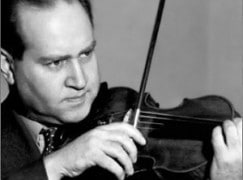What Oistrakh taught the Berlin Phil about their instruments
mainThe cellist Alban Gerhardt has published a few tips on how a young string player should go about choosing and buying an instrument. There’s no general rule except: avoid sharks, frauds and dodgy teachers.
Alban’s father played in the Berlin Philharmonic in the 1950s when players were poorly paid and many of the instruments were matchbox. Then David Oistrakh came along and taught them a thing or two.
Read Alban here.






Funny though that even back then when they had cheaper instruments, the orchestra was already famous for its rich and deep string sound (which one can also hear on recordings from the period). So I guess whatever Oistrakh “taught” them they already knew.
Same with many players in many Eastern European orchestras who retained and cultivated their traditional high quality string sound when they had only very limited access to real high quality instruments.
You don’t seriously suggest that the orchestral violinists, as good as they were, had nothing to learn from David Oistrakh, do you?
I am sure he had lots of good advice for them, but not necessarily in this context. Every good string player knows that it’s mostly the ability of the player which influences the quality of sound the player produces, not so much whether he or she has a particularly valuable instrument or not. And these players back then certainly knew that because they produced a very good string sound with not necessarily particularly outstanding instruments.
Same with the Wiener Philharmoniker, BTW. They own two sets of string instruments, one for the opera and one for concerts, and they aren’t all highly valuable instruments either, just very well made, solid instruments. But the orchestral string sound they produce is of the highest quality. And that has mostly to do with technique and playing style.
And I am sure that “he had lots of good advice for them” even “in this context” too. Because since it “has mostly to do with technique and playing style”, those are precisely the areas in which good musicians can learn from a great musician.
And what was wrong with two of my previous comments here (about the great David Oistrakh helping me choose a violin to purchase) that they never made it in?
No idea. Never saw them.
Must have been some kind of a technical glitch then.
When I was still a teenager and looking to buy a fiddle that would be better than the piece of junk I was playing at the time, David Oistrakh told me that he usually simply takes whichever one projects louder, because the character of the tone depends mostly on the player. It seemed to me like a bit of oversimplification because for most of his adult life he was probably used to choosing between truly great instruments, which was not my own situation at the time (still isn’t, frankly). Then I brought the violin that I was considering for purchase, to him, and he played a few measures of Bach’s G-minor Adagio on it. To my ears, it sounded like the greatest cathedral organ that I had ever heard… He said he liked the fiddle, and obviously I bought it immediately. Needless to say, it never sounded the same way in my hands, but it did serve me well for many years after that. Since then, I have been fortunate enough to have played several violins that are far superior, but the one that was once in DO’s hands has a special place in my heart, so it is still with me and I do play it occasionally.